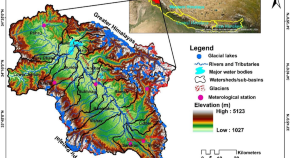Spatiotemporal dynamics of glacial lakes (1990–2018) in the Kashmir Himalayas, India using Remote Sensing and GIS
Authors (first, second and last of 7)

Collection
Keywords:Mountain Hydrology; Groundwater; Hydrogeomorphology; Water Resources; Sustainability.
Dr. Jorge Espinha Marques, University of Porto, Portugal Jorge Espinha Marques is a skilled Hydrogeologist (BSc, PhD) and Assistant Professor at the Faculty of Sciences of the University of Porto, Portugal. He is a senior researcher at Earth Sciences Institute (ICT) in Hydrogeology, Hydropedology, Mountain Hydrogeology, Groundwater Services, Water Resources and Environment. Currently, He belongs to the scientific advisory board in groundwater to the UNESCO Global Estrela Geopark in Portugal.
Professor Augusto Pérez-Alberti, University of Santiago de Compostela, Spain Augusto Pérez-Alberti is a skilled Geomorphologist (BSc, PhD) in multidisciplinary geosciences research, consultancy, and practice. Currently, it is an Emeritus Professor at the University of Santiago de Compostela (Spain) and Senior Researcher at CRETUS Institute. His main research interests are the glacial-periglacial processes and sediments, rocky coasts geomorphology, landscape analysis in mountain environments, hydrogeomorphology and mapping. He has developed research in Spain, Portugal, Argentina, Uruguay, Morocco, Chile, and Antarctica.
Dr. Helder I. Chaminé, Polytechnic of Porto, Portugal Helder I. Chaminé is a skilled Geologist (BSc, PhD, DSc) with over 30 years of experience in multidisciplinary geoscience research and practice. He is an Engineering Geosciences Professor at the School of Engineering (ISEP), Polytechnic of Porto, Portugal, and Head of the Laboratory of Cartography and Applied Geology in ISEP. He belongs to the directive board of the Portuguese Chapter of the International Association of Hydrogeologists and the Technical Committee of Environmental Geotechnics of Portuguese Geotechnical Society.
